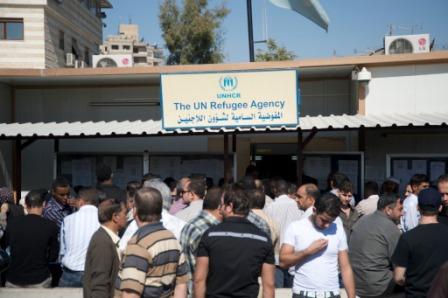Last week, I wrote a blog post about watching This Is It, the Michael Jackson movie, with a bunch of Iraqi refugees in Damascus. I would love to tell you that this week, in a natural follow-up, I went to go see New Moon in Kirkuk, and that next month we'll be watching Avatar in Amman.
To my everlasting disappointment, none of that is true. But it is true that I'm sitting here thinking about vampires -- or if not exactly about vampires, then at least about twilight worlds, and about the undead. I don't mean the kind with glittery skin (per Stephanie Meyer) or garlic phobia (per more conventional accounts, if there's any such thing as a conventional account of a vampire). I mean the kind who are undead in contradistinction to their less lucky intimates and compatriots, yet condemned by circumstance to something short of fully living. I am thinking, in other words, about Iraqi refugees in the Middle East, and about the crepuscular parallel universe they dwell in.
To give you a feel for that universe (and in case the connection to vampire movies strikes you as far-fetched), here's an odd fact: the majority of Iraqi refugees I met in Damascus were nocturnal. This wasn't true of families with young children, but otherwise, virtually everyone slept all day, woke up between four and six in the afternoon, and stayed awake until the small hours of the night.

There are a couple of possible and overlapping explanations for this phenomenon. The first is that Iraqi refugees are banned from working in Syria, which effectively eliminates any need to be a functional human being during business hours. The second has to do with the diaspora. When your friends and family members have fled to Europe or Canada or Australia or the United States, and you yourself have nothing to do all day long, you might as well shift your schedule to be awake when they are. That kind of shift wouldn't have been relevant in any other refugee crisis in history -- but, because of the particular moment we live in and the technological sophistication of Iraqis, it matters a great deal in this one. Here's why: internet cafes in Damascus are abundant and cheap - about one Syrian pound per minute, meaning you can spend an hour on Skype for less than $1.50. If you're up at 3 AM, you just might catch your cousin in California on his lunch break.
The third reason for the refugees' sleep habits is more speculative, yet probably more significant. Iraqi refugees aren't gathered together in camps, the way most of their African counterparts are. Instead, they are scattered throughout the major cities of the Middle East, where they are living on the margins, in every sense. They can't work. They cannot or do not attend school. Many of them seldom leave their apartments, not least because they have nothing to do, no money to spend, and nowhere to go, but also because they are unable to shake the habit, honed to perfection in Iraq, of staying inside and out of harm's way. They have few if any friends, outside of whatever family members they fled with. And they are reluctant to reach out to new people, partly because they see no reason to establish roots in a place where they aren't permitted to imagine a future, and partly because trust -- of one's friends, colleagues, neighbors -- was one of the most systematically and effectively destroyed commodities in Iraq.*
What do you do when you have no work, no community, no evident future? You live with your two brothers in a hallway-sized apartment, stack your mattresses on top of the refrigerator when you're awake, pull them down when it's time to sleep. You say yes to jobs so exploitative or illicit (child labor, prostitution) that no one else will take them. In short, you come to occupy all the professional, geographic, architectural, and -- yes -- temporal interstices of normal life. In fact, "normal life" ceases to exist; life itself becomes un-lifelike, unrecognizable. I can't tell you how many times in the Middle East I heard a refugee tell me that he or she was not really alive. This isn't living, they'd say. My life is over -- this, from someone who was thirty-four years old. I might as well have died in a bombing in Baghdad. I am dying in slow motion. I am already dead.
This leads me to one final reason, an obvious one, that many Iraqi refugees sleep all day: they are deeply depressed. No one is conducting statistical surveys on the sleep habits of Iraqi refugees (and thank heaven for that; we've got bigger fish to fry), but both the refugees themselves and the aid workers who spend time with them report that refugees are sleeping twelve, fourteen, sixteen, even nineteen hours a day.
Needless to say, that kind of sleep is not about laziness. Most of the Iraqis I talked to spoke passionately about the agony of not being allowed to work. I know an English teacher who kept going to school every day in Baghdad even after three members of his department were targeted and killed; in Beirut, he sat at home, wondering who he was. I know a lawyer who was going so stir crazy in Syria from not working that he begged his wife to teach him to cook. I know that 1,500 Iraqis get up every Tuesday morning at 6 AM to wait in line all day, hoping to speak to a UNHCR resettlement worker about their future.

Iraqi refugees wait outside a UNHCR office in Damascus, Syria. On Tuesdays, when resettlement issues are addressed, an average of 1500 people show up; roughly half of them will get an appointment. Photo by Alissa Everett
In other words, it's not that these refugees sleep because they don't feel like doing anything. They sleep because they have nothing to do. That kind of sleep is at once an effect and a cause of depression. In a sense, this observation falls into the "well, duh!" category; depression is arguably the least of the psychological problems faced by the average refugee. Still, to see it express itself in such a banal and pandemic form is shocking.
In the U.S., with our lingering streak of Puritanism, we regard oversleeping and - especially - staying up too late with a suspicious eye. Something louche and sinister clings to the nocturnal, with its convenient fall of darkness over all that booze and blood and danger and sin. As a lifelong night owl, I've always resisted this set of associations. When I was writing my book, I would often stay awake until 4 or 5 AM and sleep until noon, and I resented the omnipresent implication that the opposite habits were morally and physically healthier, that early birds got bonus points just for their biorhythms. But it's true that in the Middle East, the sleep habits of the refugees, as understandable as they are, felt distinctly unhealthy to me. There was something ghostly about them -- and one thing Iraqis definitely do not need is any more ghosts.
----
* A dispossessed and exoticized people, exiled from a distant Eastern land, reluctant to venture forth in daylight, living on the margins of society ... any of this sound familiar? As every Brown University literary theorist plus every teenage girl in America can tell you, all the great vampire stories in history draw their power not just from a pair of bloody incisors, but also from the pain of living a life that makes you unknowable and incomprehensible to others. Sadly, we are fascinated by this kind of torment, alienation, and otherness in fantasy, while remaining comparatively indifferent to it in real life.